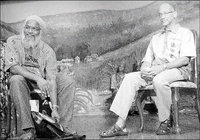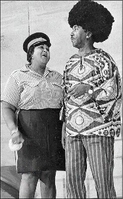KEEPERS OF THE HERITAGE: LTM - Theatre with a difference
Published: Sunday | September 27, 2009

Dr Clinton Hutton (left), lecturer in the Faculty of Social Sciences at the University of the West Indies, Mona, and Douglas Orane, chief executive officer at GraceKennedy Ltd, onstage at the Little Little Theatre in a dialogue on the importance of Emancipation celebrations, on July 31. - Contributed
The theatre is one of the world's oldest institutions. It's man's way of reflecting on life, a projection of our mores and values, or the lack thereof, onstage for introspection and entertainment. Right here in Jamaica, our own history is replete with theatre; it's a real-life drama, full of colourful twists and turns.
From the annihilation of the indigenous peoples - the Tainos, European colonisation, slavery, apprenticeship, Emancipation, Independence and postmodern notions of racism, religion, sexuality and politics, the material is rich, but enough is not being done to showcase our long and illustrious journey. Yet, one organisation which is at the forefront of using the lessons of the past to guide us to the present and future is the Little Theatre Movement (LTM).
Founded in 1941 by Henry Fowler and Greta Fowler, its first project was a national pantomime. The pantomime is a tradition of English theatre, and so in 1941 the LTM's first production, Jack and The Beanstalk, was "in keeping with the tradition of English Theatre - with elements of music, song, dance, comedy, drama and colourful costumes and sets". The Pantomime opened on Boxing Day, as was customary, and it still does.
The LTM had no home of its own when it began. The national pantomime and other LTM productions were held in various Corporate Area locations, including the Ward Theatre and the Rainbow Theatre at Half-Way Tree. In 1958, land was acquired at its present location at 4 Tom Redcam Avenue, St Andrew, for the construction of a cultural centre, including a theatre and a library. In 1961, the Little Theatre was officially opened by governor Sir Kenneth Blackburn.
dialogue in patois and humour

Barbara Gloudon
With our eventful past and ebullient personalities, it was not very long before European folklore gave "way to lusty tales of the Caribbean, with dialogue in patois and humour reflecting the robust sense of comedy of the 'islands in the sun'." Louise Bennett wrote Bluebeard And Brer Anancy (1949), Anancy And Pandora (1955), Anancy And Beeny Bud (1956), Busha Bluebeard (1957). Greta Fowler penned Anancy And The Magic Mirror (1954), Quashie Lady (1958) and Jamaica Way (1959) were scripted by Ranny Williams. And that was the watershed period in indigenous national pantomimes.
The LTM credits "this 'indigenisation' to two legends of Jamaican theatre - the late Honourable Louise Bennett-Coverley and Ranny Williams, who were among the pioneers of the LTM and who did much to mould the annual show into a unique creation, which features aspects of Jamaican culture, folklore and historical references".
The annual pantomime is not alone in showcasing Jamaican heritage, as since 1997 the LTM Pantomime Company has been commemorating the anniversary of the Emancipation from British slavery by staging Augus Mawnin, scripted by Barbara Gloudon and directed by Brian Heap. Opening every August 1, the production features traditional music, poetry, dramatic presentations and dance at the Little Little Theatre. The focus throughout the years had been on "the journey to freedom" by our African ancestors.
However, the LTM, through Gloudon, said recently, "After the 10th anniversary of Augus Mawnin, the producers decided to move to another level. Last year, the celebration took the form of a programme of songs and dance, and a sampling of a new work, Freedom Fi Who?, created by Gloudon, with the focus on the journey of the slaves after they had left the estate." She said the production was "still a work in progress, but is robust enough" to be presented in this year's season (July 31-August 2).
dialogue on Emancipation

Louise Bennett-Coverley (left) and Ranny Williams in 1969's LTM National Pantomime 'Moonshine Anancy'. The Little Theatre Movement (LTM) credits 'Miss Lou' and 'Maas Ran' for their role in the "indigenisation" of the national pantomime. - File
On July 31, singers from the Pantomime Company opened the programme with a suite of 'freedom' songs from Augus Mawnin, after which there was a dialogue on the importance of Emancipation celebrations, involving Dr Clinton Hutton, author, and lecturer in the Faculty of Social Sciences at the University of the West Indies, Mona, and Douglas Orane, chief executive officer at GraceKennedy Ltd.
After all the cultural chat and Jamaican refreshments, the Pantomime Company, by way of its actors, staged Freedom Fi Who? a one-act play written and directed by Barbara Gloudon with music by Grub Cooper. "The new work highlights the journey from the estate to finding land on which to settle and start a new life," Gloudon said.
On the evening of Saturday, August 1, the official anniversary of Emancipation, Kim Marie Spence, communications/business development consultant at the Caribbean Policy Research Institute, and Ibo Cooper, a founding member of the Third World band and head of Music Studies at Edna Manley College of the Visual and Performing Arts, reflected on 'Why Celebrate Emancipation?'
The sounds of talking drums echoed from the walls of the theatre on Sunday, August 2, in Drum Talk. Master drummers Phillip Supersad and Calvin Mitchell, with 12 drums onstage, gave electrifying performances that fired up the audience, which showed its appreciation with loud applause and shrieks. Supersad, also a ceramist, teacher and maker of instruments, showed how powerful the drum could be in stirring emotions and in the process "citing the link from the Kumina of Africa to the Tassa of his East Indian heritage". Calvin Mitchell, himself a theatre practitioner, demonstrated how an instrument without a 'mouth' could talk.
In assessing the events of the Emancipation weekend, Gloudon, who is also the chairman of the LTM, said, "From the comments of the adults and young people who attended each evening, the departure from the comedy fare, which has become standard in local theatre, demonstrated that there is room for the kind of programme presented in the Emancipation tribute. In the view of one member of the audience, 'It helps us to see ourselves and our culture in a way that all age groups can enjoy while learning something'."
Students from the University of Maryland attended on opening night. Each evening's activities culminated in 'Taste Mouth', a sampling of perennial Jamaican favourites, such as 'chawklit' tea, 'dookunoo', coconut drops and 'pudd'n'.
bona fide Jamaicaninstitution
The Little Theatre Movement, which is "Jamaica's longest surviving theatre company of contemporary times", from its early days of reflecting European sensibilities, has evolved into a bona fide Jamaican institution showcasing and preserving our rich cultural heritage. It's a beacon of hope at a time when more contemporary art forms, near and far, are pushing the traditional ones from under the spotlight.
Now, in its 70th decade, the LTM is still strident in its efforts to preserve our cultural heritage by the reenactment of events and stories of past and present. Didactic theatre in a fun and entertaining way is the essence of the LTM.
paul.williams@gleanerjm.com
















